How to be a foreign correspondent
From Our Own Correspondent is the place where journalists get to tell the stories they want to tell: the stories behind the headlines; the stories they tell their friends and family when they arrive home – the ones that don’t fit neatly into a news bulletin... They take you to faraway lands, to meet some extraordinary characters and allow you to glimpse what life is like elsewhere in the world. In the process, they often provide snippets of what it’s like to report from other countries as a foreigner.
We asked our reporters to share their tips for would-be foreign correspondents.
Lucy Williamson: βThink of it like an infantβ
For a start, the hours are unpredictable and you rarely get enough sleep. That’s particularly true when the time difference is against you. In Korea, for example, the Ten O’Clock News goes out at seven in the morning. That can mean a full day of filming, a couple of hours’ sleep, and then up to film whatever is happening the following day – sometimes for a week or more. When you have a baby, the advice is to sleep when the baby sleeps. That goes for a story too. When the fuss has died down, take to your bed and don’t get up for anything less than Armageddon.
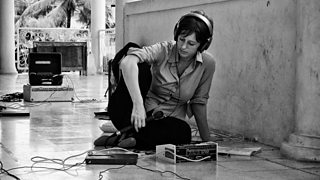
You’ll also feel responsible and even guilty about leaving your patch: anything could happen while you’re away. I once got off a 12-hour flight from Jakarta to find 36 missed calls from the foreign desk. Former President Suharto, had died about an hour in to the trip, as I was tucking into my Singapore Airlines breakfast. When you have to leave the country, you will of course organise a babysitter to cover any crises in your absence, but you will still secretly worry.
Put simply, I believe the advice is the same for new correspondents as for new parents: eat when you can, sleep when you can, and pee whenever you have the chance. And of course the other similarity, at least in my experience: you fall in love with whichever place you’re in – because it’s fascinating, always changing, because it’s yours.

Caroline Wyatt: βAlways wear sensible shoesβ
You never know when the next party will be, and they’re always fantastic opportunities for finding out the latest gossip, and sometimes real news. My only real problem as a foreign correspondent was that my fondness for socialising in foreign climes (while, of course, gathering top up-to-the-minute information on what was really going on behind the scenes for faithful listeners of FOOC) was matched solely by my fondness for champagne. Which as Paris Correspondent was a bad combination.
I remember one particularly good dinner at the Élysée Palace during the state visit of Her Majesty Queen Elizabeth II, when I sat next to a spectacularly indiscreet foreign diplomat. He regaled me with scurrilous and detailed tales of the affaires de coeur of the leadership of his country. Even if only half of it was true, this was political dynamite.
Have microphone and laptop, will travel...

Lucy Williamson is the ΒιΆΉΤΌΕΔ Paris correspondent. She has previously reported from Korea, Indonesia and the Middle East.
Caroline Wyatt is a former ΒιΆΉΤΌΕΔ Defence and foreign Correspondent, who has reported from Berlin, Paris, Moscow, Iraq, Kosovo, and Afghanistan. She presents Saturday PM on Radio 4, and The World This Week on World Service - as well as appearing on, and occasionally presenting, FOOC.
Tim Whewell is a presenter for Radio 4’s Crossing Continents and Our World on the ΒιΆΉΤΌΕΔ News Channel. He is also a Russian specialist, and was once the Moscow Correspondent for the ΒιΆΉΤΌΕΔ World Service (which involved broadcasting live from the Russian parliament, the White House, while it was under siege in 1991). He reports for Crossing Continents, Newsnight and Our World.
Adam Fleming worked on CΒιΆΉΤΌΕΔ's Newsround, before joining the Daily Politics. He is now the Brussels’ reporter for ΒιΆΉΤΌΕΔ News and his first FooC involved comparting the size of the bundles of paper positioned in front Brexit negotiators from Britain and EU.
Katy Watson is the ΒιΆΉΤΌΕΔ’s South America Correspondent, based in Sao Paulo, Brazil. She’s worked for the ΒιΆΉΤΌΕΔ in Mexico, Central America, Washington DC and Jerusalem.
Justin Rowlatt, formerly Newsnight’s ‘Ethical Man’, was the ΒιΆΉΤΌΕΔ’s South Asia correspondent from February 2015 until June 2018. He has been an enthusiastic contributor to FOOC for the more than 20 years and including the story of an Indian prince who died in poverty in a ruined monument in central Delhi, and of what happened when he brought up the issue of gay rights during a naked sauna session in a remote forest with two Russian nationalists.
Kevin Connolly is the ΒιΆΉΤΌΕΔ’s Europe correspondent, based in Brussels. He has also had postings in Dublin, Warsaw, Moscow and as North America Correspondent.
The next morning I realised, with some despondency, that the notes I had excitedly scribbled down later that night were completely illegible. And all I could remember in the harsh light of the morning after, as I soaked my throbbing head in the shower, was having my hand kissed tenderly by Jacques Chirac, being told not to ask “damn fool questions” by Prince Philip, laughing a lot and drinking some of the best champagne I’d ever tasted.

Which contradicts another piece of advice: the thing about the shoes. One morning, I’d been asked to doorstep the then German Chancellor Helmut Kohl about a CDU party financial scandal. Shouting questions from behind the barriers as he went into a meeting proved ineffective. There was only one thing for it – to stand in his way as he left the meeting, so he couldn’t ignore the ΒιΆΉΤΌΕΔ microphone.
The theory was brilliant. The reality, less so. As Helmut Kohl left the meeting, I stood in his way, brandishing a small microphone. After a few seconds, I realised the flaw in my plan. All 1.93m (6 foot 4 inches) and 120kgs (19 stone) of German Chancellor was bearing down on me. The father of unification was not going to stop for a mere journalist. Slowly, and with the same determination he’d used to stay in power for 16 years, he continued inexorably ahead. Just as his foot began to press down on mine, Kohl’s security guards sized up the situation and hoisted me out of harm's way, seizing one arm each, my legs scrabbling in the air like an upturned beetle. Thanks to my sensible shoes, I escaped with only a little light bruising to my big toe, and quite lot more to my dignity.

Tim Whewell: βTell your driver to slow downβ
Never be afraid of earning your driver’s contempt by asking to slow down.
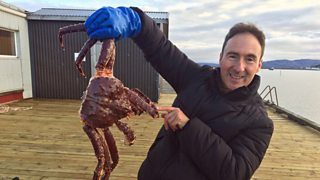
For years I hung on for dear life in cars hurtling at impossibly fast speeds along bumpy, twisty roads in remote parts of the world, with drivers who regarded any attempt to put on a seatbelt as an insult to their skill and integrity – and who I feared would be infuriated by any request to ease off on the accelerator. Now I insist on slowing down – and happily pay the price by laughing at myself: one of those cowardly Brits. It’s worth it. I’m convinced now that death on the road is actually the greatest potential danger I face as a foreign correspondent – and sometimes being assertive in the car actually leads into interesting conversations.
And... always say you smoke, even if you don’t. I missed so many chances to leave larger meetings for discreet one-to-one tip-offs outside before I realised that an invitation to go for a cigarette is often worth taking up, even if you don’t smoke. If you can’t actually face lighting up when you are alone with the person you most wanted to talk to, you can always say you actually wanted to come outside for the fresh air…

Adam Fleming: βTreat EU summits like weddingsβ
Summits are a few very momentous moments interspersed with lots of sitting around accompanied by virtually everyone you’ve ever met, which is surprisingly good fun.
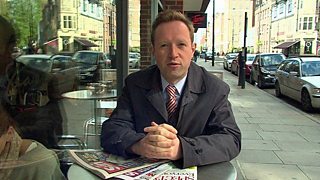
When broadcasting live, learn how to screen out the signature sound of a city crammed with ex-pats constantly shuttling between home and work – wheeled suitcases on cobbles.
Befriend some smart people who will tell you what’s really going on, but who understand that you are British and a journalist which means you are unlikely to ever tell them how grateful you are for their help.
Katy Watson: “Always invest in a good duvet”
Whether you’re working from home or on the road, the quality of your bed linen while on a story is crucial. A thin sheet doesn’t cut it, no matter the thread count. It’s all about the togs when you need a soundproofed studio on the go. Dive under, record your interview and pop back out. I think 95% of the FOOCs I’ve recorded have been under the duvet. And make sure you don’t have a lazy dog nearby … I’ve spent far too many interviews wrestling the duvet from my hound who has taken a shine to my makeshift radio studio – it’s not just correspondents who are fans of a quality duvet given half the chance. “
"And ... never work with animals, or children..."
Especially your own.

Last year I was in Brasilia covering the latest political saga and was asked to do a radio interview in the evening.
I hadn’t long returned from maternity leave and was still breastfeeding. I was hoping my little man would be fast asleep by the time came for the interview.
Sadly, babies are never the predictable little critters you’d like them to be. He started getting hungry (and squawky) a few minutes before I was about to start. In a panic, I thought I’d do the interview from the next room but soon realised that wasn’t going to stop his complaining coming down the line.
So I was left with little choice but to feed him while I did the interview. He seemed happy … so happy in fact he started squeaking away … with the presenter exclaiming, "is that your baby?!" Busted.

Justin Rowlatt: "Beware the offer of food, particularly in remote areas..."
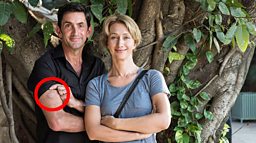
Refusing to eat will often be interpreted as an insult, but accepting can be even more challenging. I was with a tribe in the Amazon once who offered me the corpse of a charred and slightly rancid monkey. Its eyes were open and its teeth were bared in a grotesque grin. I reluctantly took a bite from its shoulder, choking back the urge to vomit. To this day I am convinced the rest of the tribe were hiding behind their huts doubled up with laughter that they’d got the ΒιΆΉΤΌΕΔ guy to do something so disgusting. But I was lucky. The producer ended up eating a tortoise’s anus.
They always say that FooC is where we correspondents get to tell the stories behind the stories you hear and see elsewhere on the ΒιΆΉΤΌΕΔ. But – as always – be careful. I have learned to my cost that sharing a funny story can risk earning you the reputation of being a complete idiot. Last year I recounted how I managed to get myself a tattoo at an Indian festival by mistake – yes that’s right, by mistake. Look it up online – most of the people I interview seem to. It certainly breaks the ice, but put it like this, it doesn’t make anyone take me more seriously.

Kevin Connolly: "Have someone in mind that youβre writing to..."
In my case it’s my mum even though she’s no longer with us – partly because she’d already concluded that ΒιΆΉΤΌΕΔ Radio was one of the glories of English-speaking civilisation even before her son starting working for it. When you know who you’re talking to, you know what to say. FOOC shouldn’t be about your interview with the Minister for Machine Tool Production in some far-flung land. It should be about something inconsequential but revealing which you notice on the way. I’m writing this from Oslo where we’re working on stories about post-Brexit customs arrangements – serious stuff. But my postcard home would be about the eccentric opening hours of the sex shop and cafe which stood side-by-side opposite our hotel. You can’t wait to tell someone about the city where you can buy a bullwhip but not a baguette at breakfast time. And there’s your point of departure.
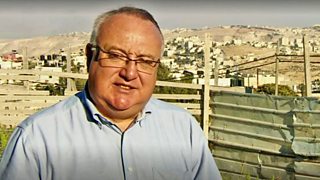
"Don’t teach or preach..."
You’re on the programme because you‘ve been somewhere interesting and not because you are someone interesting. So spare the audience the folksy piece of wisdom you claim to have picked up from some old man quietly fashioning a traditional musical instrument with ancient tools. The worst FOOC I ever wrote was from Libya on my first trip to the Arab world around 30 years ago. It was a laughably pompous piece about the politics of the Middle East liberally punctuated with the whittling of wise old men. It was quite rightly thrown in the bin when it reached London. My second attempt – written in biro on the white cardboard shirt stiffener from the hotel laundry was about how the Libyan government had duped us into thinking we were going to be taken to a strategic military centre and then taken us instead for a picnic to Leptis Magna – the site of some magnificent but irrelevant Roman remains which hadn’t enjoyed any strategic significance for a couple of thousand years. It wasn’t brilliant either but it was honest and it taught me that I had – and still have – a lot to learn.
Listen to the insight, wit and analysis from ΒιΆΉΤΌΕΔ correspondents, journalists and writers from around the world.

More Correspondents on Radio 4
-
![]()
Pick of From Our Own Correspondent
A selection of fascinating and eye-opening stories from reporters around the world.
-
![]()
The best foreign correspondent podcasts from around the globe.
-
![]()
Practical tips from our own correspondents⦠and some dire warnings!



